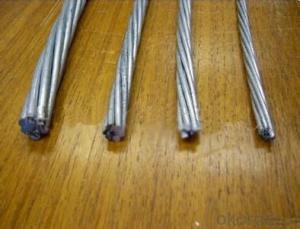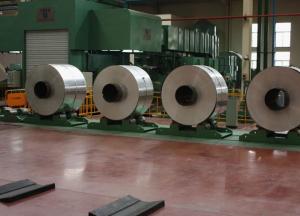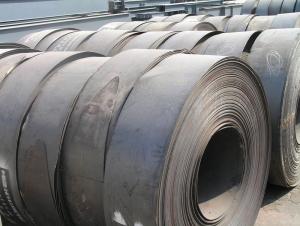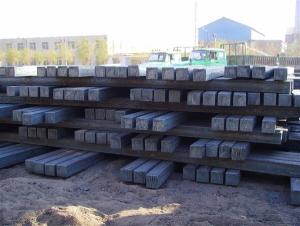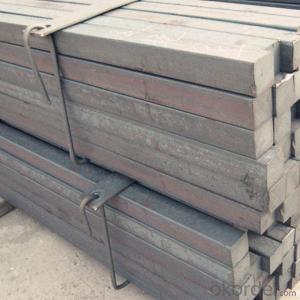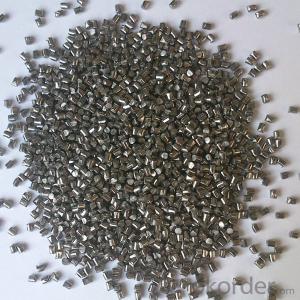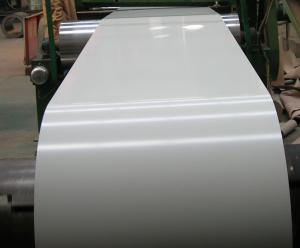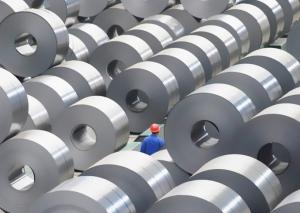Low Loose Prestressed Concrete Strand
- Loading Port:
- China Main Port
- Payment Terms:
- TT OR LC
- Min Order Qty:
- -
- Supply Capability:
- -
OKorder Service Pledge
Quality Product, Order Online Tracking, Timely Delivery
OKorder Financial Service
Credit Rating, Credit Services, Credit Purchasing
You Might Also Like
- Q:How is steel used in the production of agricultural equipment?
- Steel is commonly used in the production of agricultural equipment due to its strength, durability, and versatility. It is used to manufacture various components such as frames, blades, plows, and tillers, providing stability and resistance to wear and tear. Steel's ability to withstand harsh environmental conditions and heavy workloads makes it an essential material in the construction of reliable and long-lasting agricultural machinery.
- Q:How is steel used in the fabrication of bridges?
- Steel is commonly used in the fabrication of bridges due to its high strength and durability. It is used to construct the superstructure of the bridge, including the beams, girders, and trusses, providing the necessary support and load-bearing capacity. Steel is also used in the fabrication of bridge decks, ensuring a sturdy surface for vehicles and pedestrians to cross. Additionally, steel allows for efficient and cost-effective construction, as it can be prefabricated off-site and easily assembled on-site, making it a popular choice in bridge fabrication.
- Q:What are the different types of steel reinforcements used in construction?
- There are several types of steel reinforcements used in construction, including bars, mesh, and fibers. Steel bars, also known as rebar, are commonly used to provide tensile strength to reinforced concrete structures. They come in various shapes and sizes, such as round, square, and deformed bars. Steel mesh, or welded wire fabric, consists of interconnected steel wires forming a grid pattern and is used to reinforce concrete slabs, walls, and foundations. Steel fibers, on the other hand, are small filaments made of steel and are added to concrete to enhance its structural integrity and resistance to cracking. These different types of steel reinforcements play a crucial role in strengthening concrete structures and ensuring their durability.
- Q:What are the properties of tool steel for cutting applications?
- Tool steel is specifically designed for cutting applications due to its unique properties. It possesses exceptional hardness, wear resistance, toughness, and heat resistance. These properties allow tool steel to withstand high temperatures, maintain its sharpness, and resist deformation or chipping during cutting operations. Additionally, tool steel exhibits good edge retention and can be easily sharpened, making it an ideal choice for tools used in cutting applications.
- Q:What is the impact of steel imports on the domestic steel industry?
- The impact of steel imports on the domestic steel industry can be both positive and negative. On one hand, imports can provide access to a wider variety of steel products and potentially lower prices for consumers. However, a surge in imports can also lead to increased competition for domestic steel producers, which may result in job losses and reduced profitability. The industry's response to imports, such as implementing trade policies or investing in advanced technologies, can play a crucial role in mitigating the negative impact and fostering a more competitive domestic steel industry.
- Q:What are the different types of heat treatment processes for steel?
- There are several different types of heat treatment processes for steel, including annealing, normalizing, quenching, tempering, case hardening, and precipitation hardening. Each process has its own specific purpose and effects on the steel's properties.
- Q:How are steel pipes used in the transportation of chemicals?
- Steel pipes are commonly used in the transportation of chemicals due to their durability and resistance to corrosion. They provide a safe and efficient means of transporting various types of chemicals, including corrosive substances, acids, and gases. The steel pipes are designed to withstand high pressure and temperature, ensuring the integrity of the chemical transportation process. Additionally, steel pipes can be easily welded and connected, allowing for seamless connections and minimizing the risk of leaks or spills during transportation.
- Q:What is the role of steel in the energy sector?
- Steel plays a crucial role in the energy sector as it is used in the construction of various infrastructure and equipment necessary for energy generation, transmission, and storage. From power plants, wind turbines, and solar panels to pipelines, storage tanks, and transmission towers, steel provides strength, durability, and reliability to support the efficient and safe production, distribution, and utilization of different forms of energy.
- Q:What are the different types of steel grilles and screens available?
- There are several types of steel grilles and screens available, including welded wire mesh grilles, expanded metal grilles, perforated metal screens, and woven wire mesh screens. Each type has its own unique design and functionality, catering to various applications such as security, ventilation, filtration, and decorative purposes.
- Q:How do steel products contribute to the construction of theme-based adventure parks?
- Steel products play a crucial role in the construction of theme-based adventure parks due to their strength, durability, and versatility. Steel is used in the framework and support structures of roller coasters, water slides, and other thrill rides, ensuring the safety and stability of these attractions. Additionally, steel is used in the fabrication of various park fixtures, such as entrance arches, railings, and signage, adding to the theme and aesthetics of the park. Overall, steel products provide the necessary infrastructure and creative elements that make theme-based adventure parks exciting and visually appealing.
1. Manufacturer Overview |
|
|---|---|
| Location | |
| Year Established | |
| Annual Output Value | |
| Main Markets | |
| Company Certifications | |
2. Manufacturer Certificates |
|
|---|---|
| a) Certification Name | |
| Range | |
| Reference | |
| Validity Period | |
3. Manufacturer Capability |
|
|---|---|
| a)Trade Capacity | |
| Nearest Port | |
| Export Percentage | |
| No.of Employees in Trade Department | |
| Language Spoken: | |
| b)Factory Information | |
| Factory Size: | |
| No. of Production Lines | |
| Contract Manufacturing | |
| Product Price Range | |
Send your message to us
Low Loose Prestressed Concrete Strand
- Loading Port:
- China Main Port
- Payment Terms:
- TT OR LC
- Min Order Qty:
- -
- Supply Capability:
- -
OKorder Service Pledge
Quality Product, Order Online Tracking, Timely Delivery
OKorder Financial Service
Credit Rating, Credit Services, Credit Purchasing
Similar products
New products
Hot products
Related keywords
